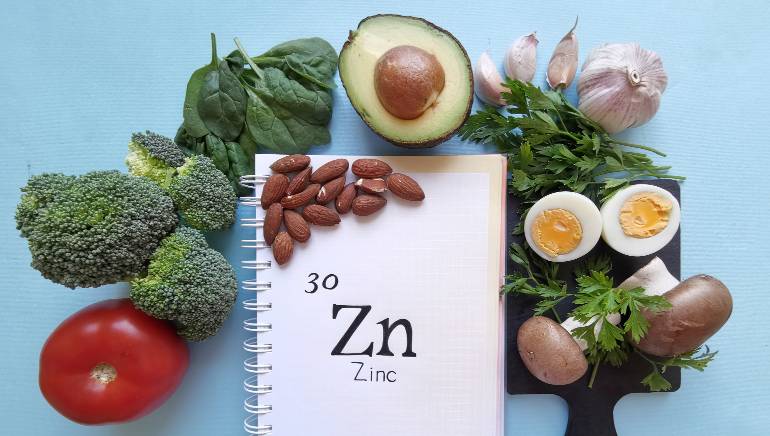Consume Foods Rich in Zinc to Boost Immune System

What is Zinc?
Zinc is a trace mineral that our bodies require in small amounts to maintain optimal health. It is found in cells throughout the body and is essential for proper immune function, wound healing, and DNA synthesis. Zinc also helps with the metabolism of carbohydrates, proteins, and fats and plays a crucial role in growth and development in children.
Benefits of Zinc for Immune System
1. Boosts Immune System
Zinc is essential for the proper functioning of the immune system. It helps to activate T-cells, which are white blood cells that play a crucial role in fighting off infections and diseases. Zinc also helps to produce antibodies that help the body to fight off viruses and bacteria.
2. Reduces Inflammation
Zinc has anti-inflammatory properties that can help to reduce inflammation in the body. Chronic inflammation can weaken the immune system and increase the risk of developing chronic diseases such as heart disease, cancer, and diabetes.
3. Promotes Wound Healing
Zinc plays a vital role in wound healing. It helps to maintain the integrity of the skin and mucous membranes and is essential for the formation of new tissue. Zinc also helps to regulate the inflammatory response, which is an essential part of the wound healing process.
4. Supports Growth and Development
Zinc is essential for the growth and development of children. It is required for proper cell division and differentiation, which is necessary for the development of healthy bones, muscles, and organs.
Zinc-Rich Foods
Zinc is found in a variety of foods, including:
- Shellfish, such as oysters, crab, and shrimp
- Meat, such as beef, pork, and lamb
- Poultry, such as chicken and turkey
- Dairy products, such as milk, cheese, and yogurt
- Nuts and seeds, such as pumpkin seeds, cashews, and almonds
- Legumes, such as chickpeas, lentils, and beans
- Whole grains, such as brown rice and quinoa
It is important to note that the bioavailability of zinc varies depending on the source. Animal sources of zinc are more readily absorbed by the body than plant-based sources. However, vegetarians and vegans can still obtain adequate amounts of zinc by consuming a variety of plant-based foods.
How Much Zinc Do You Need?
The recommended daily intake of zinc varies depending on age and gender. The following table shows the recommended daily intake of zinc:
| Age | Male | Female |
|---|---|---|
| 0-6 months | 2 mg | 2 mg |
| 7-12 months | 3 mg | 3 mg |
| 1-3 years | 3 mg | 3 mg |
| 4-8 years | 5 mg | 5 mg |
| 9-13 years | 8 mg | 8 mg |
| 14-18 years | 11 mg | 9 mg |
| 19+ years | 11 mg | 8 mg |
Benefits and Drawbacks of Zinc Supplements
Benefits
- Zinc supplements can help to boost the immune system and prevent infections.
- Zinc supplements may help to reduce the duration and severity of the common cold.
- Zinc supplements may improve wound healing and reduce inflammation.
Drawbacks
- High doses of zinc supplements can cause nausea, vomiting, and diarrhea.
- Zinc supplements can interact with certain medications, including antibiotics and diuretics.
- Long-term use of zinc supplements can lead to copper deficiency.
Conclusion
Consuming foods rich in zinc can help to boost our immune system and improve our overall health. Zinc is essential for immune function, wound healing, and growth and development. It is found in a variety of foods, including shellfish, meat, poultry, dairy products, nuts and seeds, legumes, and whole grains. While zinc supplements can provide additional benefits, it is important to consult with a healthcare provider before taking any supplements to avoid potential side effects.
FAQs
1. Can zinc prevent COVID-19?
While zinc has been shown to have antiviral properties, there is currently no evidence that taking zinc supplements can prevent COVID-19. The best way to prevent COVID-19 is to practice good hygiene, wear a mask in public, and practice social distancing.
2. Can taking too much zinc be harmful?
Yes, taking high doses of zinc supplements can be harmful and cause nausea, vomiting, and diarrhea. It is important to follow the recommended daily intake of zinc and consult with a healthcare provider before taking any supplements.
3. What are the symptoms of zinc deficiency?
The symptoms of zinc deficiency include a weakened immune system, slow wound healing, hair loss, skin rashes, diarrhea, and loss of appetite.
4. Can vegetarians and vegans obtain adequate amounts of zinc?
Yes, vegetarians and vegans can obtain adequate amounts of zinc by consuming a variety of plant-based foods, including nuts and seeds, legumes, and whole grains. However, the bioavailability of zinc from plant-based sources is lower than animal-based sources, so it may be necessary to consume larger amounts of zinc-rich plant-based foods to meet the recommended daily intake.
